Oh, yeah, sure, Henry. Blame all your mistakes on "Hyde"
Last active 60 minutes ago
Don't wanna be here? Send us removal request.
Text
"Name two characters who match each other's freak!" Jekyll and Utterson. Like yeah okay, Jekyll had a lot of shit going on what with medically transitioning every other night and trampling children, but Utterson's nosy ahh self was watching over that door like his life depended on it--all because he had an INKLING his "friend" might be in trouble. AND THEN!!! He was willing to protect Jekyll from his association with Hyde by bending the law. And his entire thing is being morally upright and rarely ever straying from protocol. They were nasty little freaks, and although making out wouldn't fix anything it would at least put a pause to their homoerotic tennis freakathon.
364 notes
·
View notes
Text
tagging @origami-butterfly bc i think you'll be interested at least
So some posts about women in The Strange Case of Dr. Jekyll and Mr. Hyde and it's adaptations have been going around, so I thought I'd give my two cents that no one asked for.
In the original novella there is one important female character I can think of- The girl Hyde tramples. I have not seen any J&H movies or adaptations, unless you count the four episodes of Once Upon a Time that had a (bad) J&H plotline, but i have a decent impression of how most adaptations treat the women they add in.
First of all, I don't think adding women to Jekyll & Hyde is necessary. It speaks to the attitudes of the time that more women are not in the original book, but the book as a whole is inextricably linked with the attitudes of the time, and separating the culture from the novel serves to strip away much of its meaning. Perhaps casting the butler Poole as a woman, or even making Lanyon a woman could be reasonable ways of putting a little more diversity into screen/stage adaptations, but the novel does not even pass the 'two men talk to each other about something that isn't a man' test.
A piece of media does not need to pass the Bechdel test to be good, or interesting. Frankenstein, J&H, Les Mis, Dracula (iirc), and the Christian Bible are all, to my knowledge, things that do not pass the Bechdel test. They are not less valuable for that.
Many J&H adaptations add a love interest to be killed or spurned by Hyde, or a sex worker to be raped or killed to display how evil he is. I hope I need not say that adding a woman to your story just for her to be fridged to say something about a male character is FAR more sexist and hard to watch than a piece of media that just happens to have a lack of women.
At it's heart, Jekyll and Hyde is a story that needs few characters to be told. There is, of course, Dr Jekyll himself, his alter ego Hyde, Utterson, the lawyer turned detective, Lanyon, and Poole. Any other people that show up in the story are unimportant except for what they say about the main characters (pretty common in fiction. the family that dies at the beginning of the hero's journey is not important in and of themselves). The girl that is trampled by Hyde is there to set up how Enfield met him, and tell the audience how evil he is. The old man who is trampled is there to shock the audience and Utterson, and reveal a new depth to Hyde's cruelty. Now, there's something to be said for the fact that the old man is named while the little girl is not.
While pieces that are less adaptations and more inspired by J&H have far more freedom in what they add and what they omit- The Glass Scientists comic, for instance- adaptations that aim to bring the book to stage or screen should actually read the book before deciding what should take place. I would say that adding a love interest not only is unnecessary, but in fact actively harms the effectiveness of any J&H adaptations. Jekyll and Hyde is simply not about that. It is not a love story, (except, you could argue, the love for Jekyll that drives Utterson to become more invested in his hunt for Hyde) and trying to make it a romance interferes with the point and themes of the story, just like switching the perspective from Utterson to Jekyll messes up the story.
The reason why so many adaptation of Jekyll and Hyde fail to capture the essence of the original novel, is that none of the people in charge of them seem to understand the novel at all. They don't understand why Gabriel Utterson is not only not boring, but why he is the lens through with Stevenson chose to tell the story. They don't understand that Hyde is not a separate person, or an evil second personality, or anything else, but that he IS Jekyll, and Jekyll is him (which is an interesting point about humanity's unwillingness to accept the presence of evil inside of ourselves but i don't think most screenwriters are doing that on purpose). And they don't understand why, to put it simply, the Strange Case of Dr. Jekyll and Mr. Hyde does not need the addition of a love interest, and in fact is better for the lack of one.
39 notes
·
View notes
Text
Very significant to me how Seward mis-theorises Renfield going to the chapel to seek out Dracula as going to seek out God.
It's a great example Stoker's vampirism as a perversion of Christianity. Already we have images of blood as life, as a symbol of resurrection or immortality, linked to the undead rather than the Eucharist. Stoker has established that Dracula is repelled by crucifixes, and now he's expanding the idea. The Count isn't just ungodly, he's characterised by a corrupted inversion of faith. He's taken up residency in an abandoned chapel, like he did the unconsecrated grave in Whitby, and Renfield's worship of him (and note the proper noun You's in his speech outside the church) is furthering the link.
It's creating a very weird paradox too, in that Dracula seems to depend on Christianity conceptually as much as he is weakened by it
1K notes
·
View notes
Text
Something I really enjoy about Mina as a character is she clearly lives very much in the lives of her loved ones, Lucy and Jonathan's anxieties are her anxieties, she's a carer, yet she also knows who she is. She's not afraid of her own company and she is always finding new things to learn about and projects to undertake. I really really respect people like that.
#no bc Stoker wrote women so well#there were not many in Dracula but God they were multilayered and complex and unique
526 notes
·
View notes
Text
I understand hating on people who call Utterson John now, I get it, that is a Gabriel, that is Gabriel John Utterson, that is not John, thats old Gabe, thats Gabester, thats the Gabemeister, I get it now. Old Gabey.
47 notes
·
View notes
Text
Daily Dracula is so fun because it turns out I don’t know shit about Dracula.
Who is this spider man? A friend, that’s who.
Is my poor Jonathan Harker going to die horribly? It sure seems that way, but hell if I know!
Are Lucy’s boys going to run over here and save everyone? Is Dracula going to come to London? Nobody knows! It’s not like this is a classic novel that’s been in public domain for hundreds of years.
Anyway, shout-out to people who were Dracula fans before this whole thing, I’m sure you’re having a blast watching us go in blind.
#please as a certified Dracula Enjoyer all these people just raw dogging it like God intended are the funniest fucking thing#good for you clueless wonders it's a whole Rollercoaster the first time through
932 notes
·
View notes
Text

[image: tweet by thefourthvine, transcribed below:]
Extremely concerned that the response to #DraculaDaily on my timeline:
Non-lawyers: Jonathan, RUN
Lawyers: I have never seen such an accurate depiction of the first few years of practicing law
27K notes
·
View notes
Photo

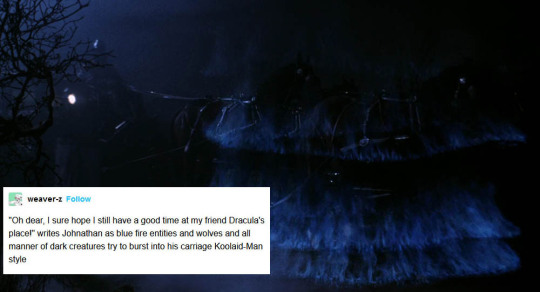

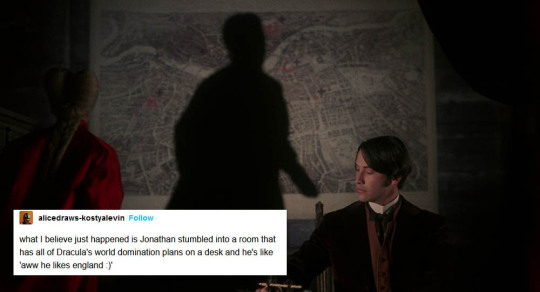
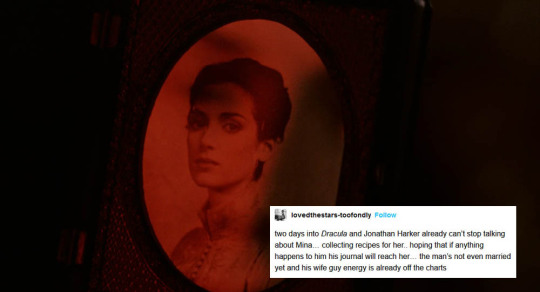

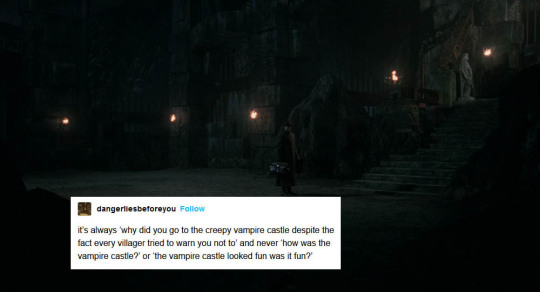
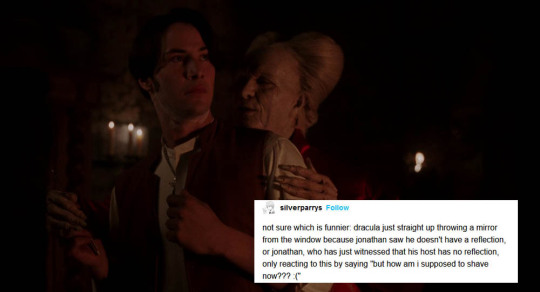

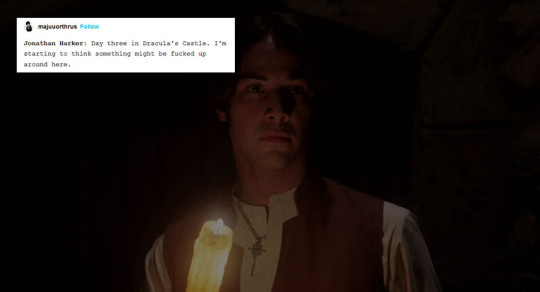
Bram Stoker’s Dracula (1992) + Dracula Daily text posts
2K notes
·
View notes
Text
2018: you wake up one morning to discover that one of your mutuals has started posting almost exclusively about kpop
2022: you wake up one morning to discover that most of your dash and apparently nearly every active user on tumblr has started posting about their best friend jonathan harker having the weirdest trip of his life on his way to transylvania to visit count dracula. yeah that one.
79K notes
·
View notes
Text
I love the character development Arthur and Jonathan have in Dracula.
They go from naive young men who can do nothing but despair due to their circumstances, to two men who actively work to decide their future and put themselves at the forefront of the fight. (I'm not just referring to physical combat.)
Especially Arthur, who's managed to set aside all his grief, who begins using his position and resources to help the team only, and doesn't seem to care for any of it otherwise. He steps up even when he isn't capable of doing something, and he learns how to do it. Not to mention the way he actively looks out for the others.
And Jonathan being one of the two to directly slay the object of their misery, (along with Quincey, who also has strong character) was so gratifying. Especially since he was the first to suffer at Dracula's hand, and even saw himself responsible for bringing him to England in the first place.
I love the way all of the characters develop and are all able to stand firmly on their own two feet by the end of the book. They all find a new strength individually, and together as a group, and even a family. I love all their subtle developments, and I really wish their collective relationship as a team was better portrayed for those who haven't read the book.
#give them the appreciation they deserve#tbh I feel that the heart of the book WAS the team's individual character development together#and literally every adaption after has failed to recognize this
157 notes
·
View notes
Video
Spent the last couple days making this Frankenstein animatic because this audio made me immediately think of this scene, anyways:
Keep reading
466 notes
·
View notes
Text
Could we crash tumblr if we all posted the word "crash" on the 1st of april 2022, 12:35 EST?
139K notes
·
View notes
Text
Random but I love the first four chapters of Dracula, the ones depicting Jonathan Harker's stay at the castle.
I love how Jonathan's character in a way reflects the reader's first impression of the book. He is young and naive, but thrilled to be traveling to a foreign country for possibly the first time. And for Victorian audiences, this might be their first vampire novel.
I also love how even though Jonathan goes on to stay at the castle (and many people like to comment on how foolish his decision was considering the reactions of the villagers), he is aware of the unsettling atmosphere, and seems aware that something is wrong, and has several good reasons for doing so:
1. He and Mina were dirt poor at the start of the book and he needed the money, and also the reputation to advance in his career. (He had just gotten his first job in a foreign land, he couldn't squander the opportunity.)
2. He could easily link the villagers' reactions with common superstitions, which he might have read about while doing his research (and I doubt the Victorians would have believed such things anyway, as they likely would have seen it as madness, something much feared at the time).
3. At the end of the day, he was doing this for Mr. Hawkins, his lifelong mentor (and second father), who was ill and couldn't make the journey, not to mention all the kind things he said in his letter.
However, he realizes his predicament quickly enough, and easily becomes aware of the Count's manipulation tactics, able to judge his intentions. I think it creates a very interesting dynamic between the two men. He learns new information quickly, and is able to use that to his advantage (he is albeit a little reckless and even irrational at times, but yay for realistic character flaws!). He is clever, and Mina is intelligent, and they complement each other well. And they would make a great detective couple. (Someone draw/write that please. Might even do it myself eventually.)
On a different note, I know people might not agree, but I think Arthur and Lucy were perfect for each other. They seemed to really get one another, and I think they had the most in common. (Arthur does lose browney points for saying she was getting fat that one time though lol.) I wish we could have seen more of them together, it would've been lovely to see the way the two main couples differ.
Yeah this sort of turned into a Jonathan/Arthur appreciation post (could've made it more so though), I just feel they deserve it honestly.
(Unpopular opinion: The guys are smarter than everyone says they are and no one in the main cast is even remotely boring. They all have something about them you can love and appreciate.
Mina is still the most intelligent character though, I honestly don't understand why adaptations take that from her it's ridiculous.)
#snob boy#😭😭😭#jonathan harker#mina harker#arthur holmwood#dracula#those are my favorite chapters tbh#its the closest we actually get to dracula as a character and where we get the most idea of WHO he is rather than WHAT
121 notes
·
View notes
Text
I will. They're a hetero couple written homoerotically. How else do you describe Lucy wanting to marry Mina "if she could", Jonathan's comfort with 4 other men actively around his wife [when you know how a -- straight-- man would react]. They're communication, passion, and equality (given the time) in the relationship, are so pure and devoid of the possessiveness of the average hetero couple.
Them you for coming to my tedtalk
Jonathan and Mina Harker are a man and a woman married to each other in a novel published in 1897 but people trying to break them up in adaptations still feels homophobic
No, I will not explain
264 notes
·
View notes
Text
i could write a 50+ page dissertation on this (and i’m going to), but i’ll try to keep it as brief as i can for now
looking at the evolution of vampire stories and how people interpret them FASCINATES me because everyone’s taken vamp metaphors 101 (vampirism = sex) so everyone agrees that there is something sexual about vampires, but then they always ignore the “vampires are monsters” part. and i get why—there’s a pattern with stories about monsters, where marginalized people see themselves in the monster rather than the hero, leading to reinterpretations that paint the monster as the sympathetic party. and that’s good! that is genuinely interesting to see! and i love seeing lady vampires and gay vampires who aren’t evil for being female and sexy or lgbtq+!
but like, that’s not the only thing vampires can represent?? what i’ve observed in my many years of consuming vampire media, discussing vampire media, and reading about vampire media is that vampirism is sex but it’s only the unnecessarily demonized parts. vampirism is sexual deviance that’s not actually deviance. vampirism is sex until you get to the parts that people don’t want to admit exist. because i’m (not) sorry, but vampires can be related to sex and still be irredeemable monsters.
i’ll put it this way: count dracula is an older, wealthy, aristocratic man who used to be a warlord, and all of his victims that he turns are young women.
but yeah, let’s keep on freudian reading our way to “lucy and mina were asking for dracula to chomp on them and they liked it,” that’s an excellent reflection of the culture we live in.
153 notes
·
View notes
Text
Fuck it, I'm making an Utterson appreciation post to go along with my last rant.
Utterson is such an underrated character, both in the fandom and official J&H adaptations. Despite being the protagonist, he's either left out of adaptations, or has a nearly insignificant role. As your average Utterson enjoyer, it frustrates me. Enough to make a post about it.
Most people think he's boring, and ultimately useless in discovering the truth behind Hyde since Jekyll spells it out for him. However, for the second part, you have to be realistic: if you were in his position, would you have accused your best friend of witchcraft and murder? His entire profession is about logic, and the only reason that the reader can theorize that Jekyll and Hyde are the same is because we have a third-person perspective. This is more subjective, but I personally prefer Utterson's point of view. The reader expects there to be a logical, normal conclusion to the story, which adds to the mystery and makes the twist more surprising.
As for Utterson being 'boring,' I think it offers a new way to look at his character. When he looked at the body of Carew (which was explicitly described as mangled) he was not as disgusted as most people would be. He is a lawyer, and although he sees dead bodies in his work, there are other instances of his reactions being unusual. When Lanyon dies, he only says that he was "sadly affected," and that's about the extent of his emotions. Even when Lanyon was on his deathbed, he was more interested in figuring out Jekyll's strange behavior. When he thinks Jekyll is dead, Utterson once again is puzzled by the mystery, rather than being upset by his friend's death. He stutters once when mentioning this possibility, but shows no other emotions. With all of this in mind, I think his work has desensitized him and altered how he reacts to situations. This doesn't make him boring, but rather more introspective, and not easily moved emotionally. A boring person would be dreadful to spend time with, but once you get past his tough exterior, Utterson is described as being "liked well" by hosts.
TL;DR: Utterson is just traumatized from work, not boring. He is also a clever literary tool to reveal the twist at the end of the book.
#please he's so analytical and straightforward#as far as in story Canon goes he's probably the best detective#nobody else *cares* like he does and even though this whole thing started by his passion for his friend's wellbeing the way he almost loses#track of that in lieu of solving the mystery gives him the same potential as Sherlock Holmes#and if everyone's drooling over Holmes it's only fair that Utterson gets to be written with the same enthusiasm#but that's just an opinion
108 notes
·
View notes
Note
Would Frankenstein’s monster be considered a homunculus?
Interesting question!
Generally, the goal of a homonculus is the artificial production of a soul. An alchemist attempts to artificially replicate all of the different physical processes involved in the creation of a human being, for the purpose of synthesizing the divine act of the creation of life. The key word there is process. The alchemist is attempting to understand what exactly happens when a new life is formed from nothing, and replicate that process.
The monster is assembled from pre-used parts and animated by some mysterious force. The monster isn't grown from scratch, he's assembled. That would be atypical for a homonculus. Using existing parts especially ones that are already undergoing putrefaction, would be alchemically impure.
In the story, Frankenstein has an interest in alchemy, and alchemical stories about homonculi probably inspired both Frankenstein in the story, and Shelly as an author. Frankenstein is liminal. He, like all good monsters, straddles a strange boundary; he is both alchemist and scientist. The monster he creates is neither human nor homonculus. He is something new, and that is a terribly lonely thing to be.
2K notes
·
View notes